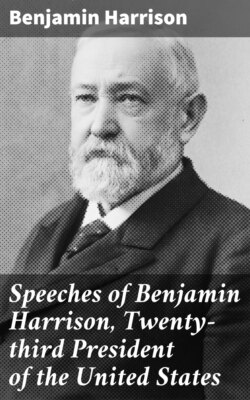Читать книгу Speeches of Benjamin Harrison, Twenty-third President of the United States - Benjamin Harrison - Страница 19
На сайте Литреса книга снята с продажи.
INDIANAPOLIS, JULY 24.
ОглавлениеTable of Contents
On the twenty-fourth of July Champaign County, Illinois, contributed a large delegation under the direction of Hon. F. K. Robeson, Z. Riley, H. W. Mahan, and W. M. Whindley. Their parade was conspicuous for the number of log-cabins, cider-barrels, coons, eagles, and other campaign emblems.
Prominent members of the delegation were Rev. I. S. Mahan, H. M. Dunlap, F. M. McKay, J. J. McClain, James Barnes, Rev. John Henry, H. S. Clark, M. S. Goodrich, A. W. McNichols, Capt. J. H. Sands and three veterans of 1836, the Rev. S. K. Reed, Stephen Freeman, and W. B. Downing. Hon. Frank M. Wright delivered the address on behalf of the visitors. General Harrison responded:
My Friends—I feel very conscious of the compliment which is conveyed by your presence here to-day. You come as citizens of an adjoining State to manifest, as your spokesman has said, some personal respect for me, but much more, I think—your interest in the pending contention of principles before the people of the United States. It is fortunate that you are allowed, not only to express your interest by such popular gatherings as these, but that you will be called upon individually, after the debate is over, to settle this contention by your ballots. An American political canvass, when we look through the noise and tinsel that accompanies it, presents a scene of profound interest to the student of government. The theory upon which our Government is builded is that every qualified elector shall have an equal influence at the ballot-box with every other. Our Constitutions do not recognize fractional votes; they do not recognize the right of one man to count one and a half in the determination of public questions. It is wisely provided that whatever differences may exist in intelligence, in wealth, or in any other respect, at the ballot-box there shall be absolute equality. No interest can be truly subserved, whether local or general, by any invasion of this great principle. The wise work of our fathers in constructing this Government will stand all tests of internal dissension and revolution, and all tests of external assault, if we can only preserve a pure, free ballot. [Applause.] Every citizen who is a patriot ought to lend his influence to that end, by promoting necessary reforms in our election laws and by a watchful supervision of the processes of our popular elections. We ought to elevate in thought and practice the free suffrage that we enjoy. As long as it shall be held by our people to be the jewel above price, as long as each for himself shall claim its free exercise and shall generously and manfully insist upon an equally free exercise of it by every other man, our Government will be preserved and our development will not find its climax until the purpose of God in establishing this Government shall have spread throughout the world—governments "of the people, by the people, and for the people." [Cheers.]
You will not expect, nor would it be proper, that I should follow the line of your spokesman's remarks, or even allude to some things that he has alluded to; but I will not close without one word of compliment and comradeship for the soldiers of Illinois. [Applause.] I do not forget that many of them, like Logan—that fearless and first of volunteer soldiers—at the beginning of the war were not in sympathy with the Republican national administration. You had a multitude of soldiers besides Logan, one of whom has been immortalized in poetry—Sergeant Tillman Joy—who put their politics by "to keep till the war was through;" and many, I may add, like Logan, when they got home found new party associations. But we do not limit our praise of the loyalty and faithfulness of your soldiers to any party lines, for we realize that there were good soldiers who did resume their ante-war politics when they came back from the army. To such we extend a comrade's hand always, and the free and untrammelled exercise of his political choice shall not bar our comradeship. It happened during the war that three Illinois regiments were for some time under my command. I had opportunity to observe their perfection in drill, their orderly administration of camp duties, and, above all, the brilliant courage with which they met the enemy. And, in complimenting them, I take them as the type of that great army that Illinois sent out for the preservation of the Union and the Constitution. Let me thank you again for your friendly visit to-day; and if any of you desire a nearer acquaintance, I shall be glad to make that acquaintance now.
